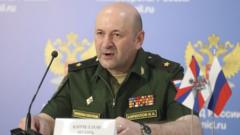Kirillov was known for his provocative claims against Ukraine and Western nations. His position in the Russian military led to accusations from the West regarding the orchestration of chemical warfare on Ukrainian soil. As the head of Russia's Radiation, Chemical and Biological Protection Troops, Kirillov presented a series of controversial claims that included the alleged development of biological weapons laboratories by the US in Ukraine, which were used to justify Russia's invasion.
His death has been framed by supporters in Russia as a significant loss, recognizing Kirillov's role in shaping the chemical warfare narrative that Russia has employed throughout the conflict. Following his death, the Russian parliament acknowledged the incident as an "irreparable loss," showcasing Kirillov's importance within the military establishment even amid the controversies surrounding his actions.
Prior to his death, Kirillov faced criminal accusations from Ukraine’s SBU security service for the mass use of chemical munitions against Ukrainian forces, with reports highlighting significant instances of toxic weapons deployment since the start of the Russian invasion in February 2022. His claims were met with skepticism from the international community, where Western countries dismissed his assertions as fabrications.
Among his last statements, Kirillov claimed that Ukraine aimed to develop a "dirty bomb," a narrative that drew immediate condemnation from Ukraine’s leadership, who suggested that such rhetoric indicated Russia's own preparations for chemical weapons deployment. His increasing notoriety for making unfounded accusations highlights the broader disinformation strategies employed by the Kremlin in the context of the war.
The implications of his death could potentially alter the dynamics of information warfare between Russia and Ukraine, and it remains to be seen how the shifts in leadership within the Radiation, Chemical and Biological Defence troops will impact the ongoing conflict.
As the war continues to engulf the region, Kirillov's legacy as a principal figure in Russia’s chemical warfare narrative stands as a testament to the complex interplay of military propaganda and real-world conflict, revealing how narratives can shape public perception and foster international tensions.
His death raises pressing concerns about accountability for wartime actions, and it opens a new chapter in the narrative of the war, as both sides maneuver for control over public perception and strategic advantage in a landscape increasingly dominated by accusations of chemical warfare.
His death has been framed by supporters in Russia as a significant loss, recognizing Kirillov's role in shaping the chemical warfare narrative that Russia has employed throughout the conflict. Following his death, the Russian parliament acknowledged the incident as an "irreparable loss," showcasing Kirillov's importance within the military establishment even amid the controversies surrounding his actions.
Prior to his death, Kirillov faced criminal accusations from Ukraine’s SBU security service for the mass use of chemical munitions against Ukrainian forces, with reports highlighting significant instances of toxic weapons deployment since the start of the Russian invasion in February 2022. His claims were met with skepticism from the international community, where Western countries dismissed his assertions as fabrications.
Among his last statements, Kirillov claimed that Ukraine aimed to develop a "dirty bomb," a narrative that drew immediate condemnation from Ukraine’s leadership, who suggested that such rhetoric indicated Russia's own preparations for chemical weapons deployment. His increasing notoriety for making unfounded accusations highlights the broader disinformation strategies employed by the Kremlin in the context of the war.
The implications of his death could potentially alter the dynamics of information warfare between Russia and Ukraine, and it remains to be seen how the shifts in leadership within the Radiation, Chemical and Biological Defence troops will impact the ongoing conflict.
As the war continues to engulf the region, Kirillov's legacy as a principal figure in Russia’s chemical warfare narrative stands as a testament to the complex interplay of military propaganda and real-world conflict, revealing how narratives can shape public perception and foster international tensions.
His death raises pressing concerns about accountability for wartime actions, and it opens a new chapter in the narrative of the war, as both sides maneuver for control over public perception and strategic advantage in a landscape increasingly dominated by accusations of chemical warfare.




















